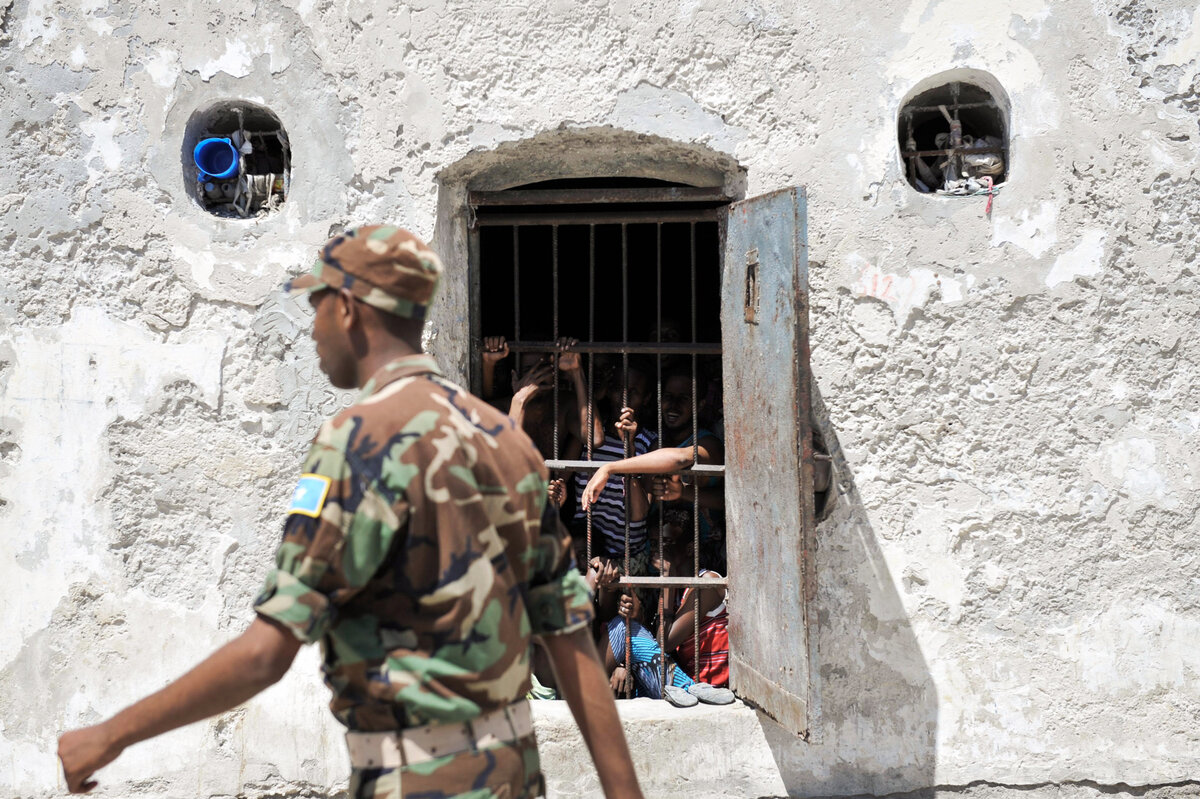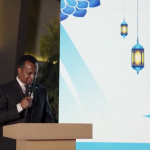Kismayo – The work of a committed teacher is to inspire and help students develop through education, with the ultimate goal of becoming productive members of society. It could be argued that people convicted of crimes and sentenced to jail warrant special attention in this regard.
According to the United Nations Standard Minimum Rules for the Treatment of Prisoners, further education should be provided to all prisoners, with the schooling of illiterates and young prisoners compulsory.
As Somalia rebuilds after decades of conflict and instability, education for prisoners has not been a priority due to other priorities for the country’s development.
However, in Somalia’s southernmost Federal Member State of Jubaland, one man – Abdiwali Nune Ibrahim – is trying to change that for inmates at the Kismayo Central Prison, which is located in in the city’s centre and currently has close to 100 inmates in its confines.
In a volunteer capacity, he teaches many of the usual subjects which students are taught around the country – for example, literacy, mathematics, and social studies – even though he could be doing the same in an actual classroom in the Jubaland’s regular education system.
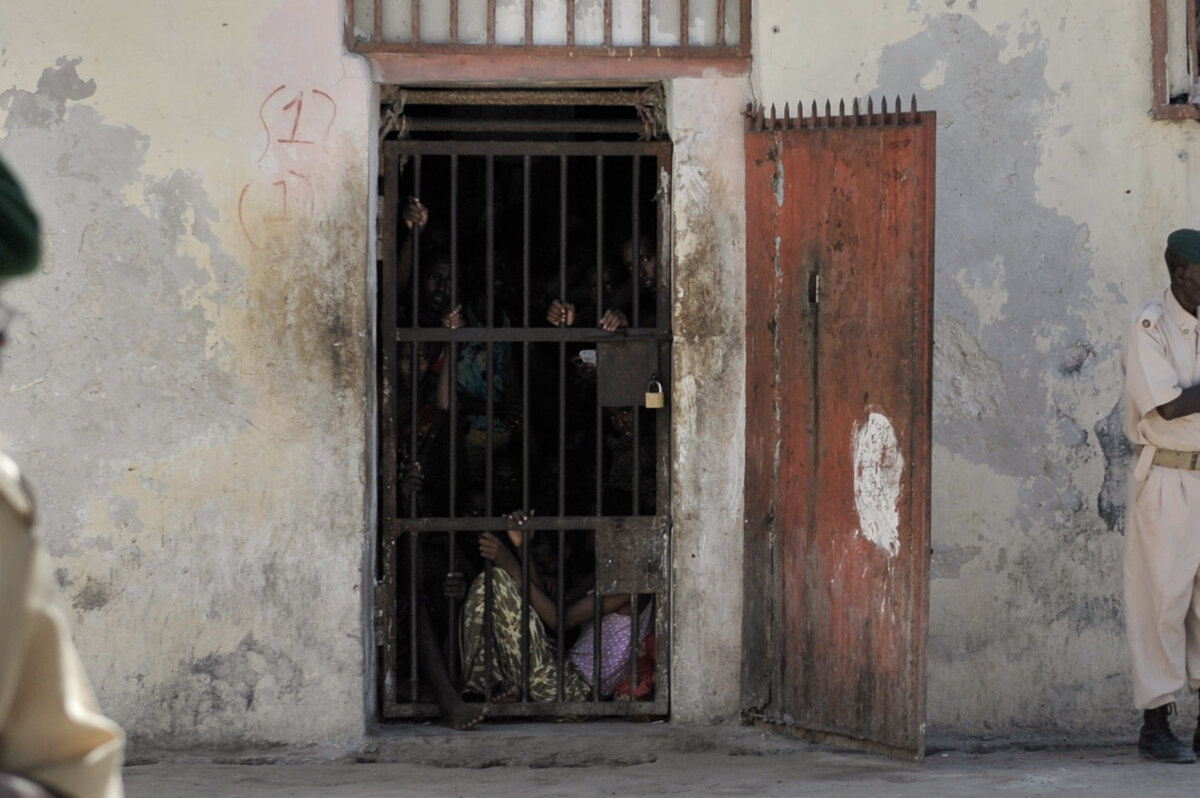
Thematic Photo: AU UN IST
Before starting his teaching initiative, Mr. Ibrahim was employed as a clerk for the prison administration, and through his work he interacted with its inmates.
“I was working with the Kismayo custodial corps, charged with overseeing its administrative operations, so I often visited the prison and it was then that I took an interest in talking with the inmates – as I got to know them and how they ended up there I also became aware of their level of literacy,” Mr. Ibrahim says.
“I could not really comprehend that most of them lacked a basic education, and it was then that the urge to start teaching programmes for the inmates came to my mind,” he adds.
Over the past three years, in addition to his regular clerical work five days a week at the prison, Mr. Ibrahim has also given classes to an average of 70 inmates per week. Prior to his efforts, most of the inmates were not provided with any such educational activities, nor any vocational and rehabilitation programmes.
The 27-year-old fervently believes that his efforts will have long-term benefits for the inmates themselves but also for their local communities, and for Somalia as a whole, when their sentences are over.
“It is through these trainings that certain mindsets and perspectives can be moulded. For instance, if a person who has committed a crime is not rehabilitated nor trained to know and understand that what they did was wrong, then at the person’s release there is every possibility that that individual will relapse into the same criminal behaviour,” Mr. Ibrahim says.
“And although I am not a psychological expert, I often encounter traumatized inmates, and I encourage them to come for classes and make their time at the prison productive,” he continues, noting that being focused on studies and bettering themselves has appeared to help for such inmates.
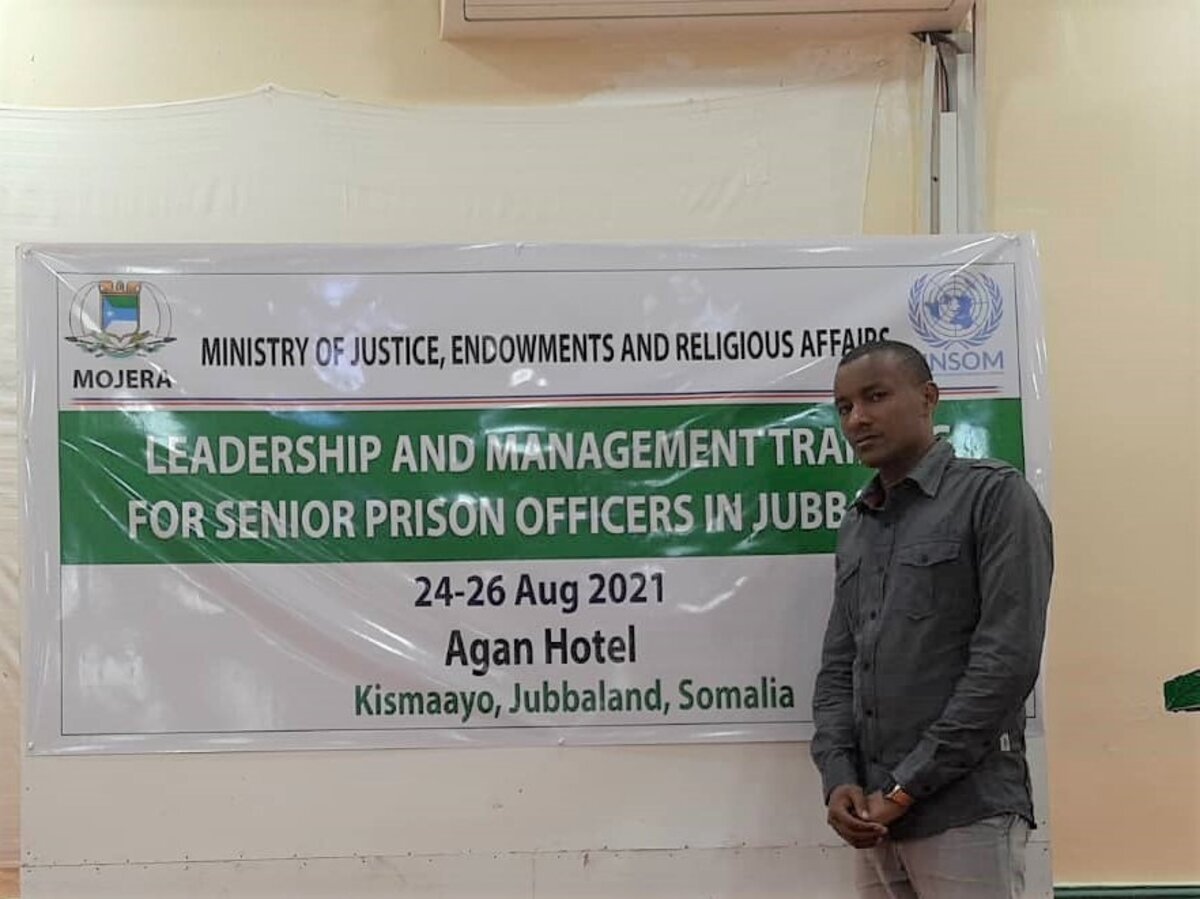
Educator by training
In a way, Mr. Ibrahim’s return to teaching was not entirely unexpected.
He was born in 1995 in Dinsor, in the Bay region of Somalia’s South West State, which neighbours Jubaland. He grew up in the town of Dollow Ado, near the Somalia-Ethiopia border, where his family lived throughout Somalia’s civil war. It was there that he attended primary and secondary school.
In 2016, Mr. Ibrahim moved to Jubaland’s interim capital, Kismayo, and went on to gain a Diploma in Education in 2018 from the Jubaland Teachers Training College, located in the city.
After graduation in early 2018, he briefly taught at the Hawa Tako Primary School in Kismayo before joining the city’s central prison as a clerk. He left teaching for a career in the Federal Member State’s custodial corps, believing that he could also have a positive impact there, particularly in relation to supporting efforts to strengthen the rule of law.
Mr. Ibrahim does what he does without much formal backing. The local authorities are unable to provide support as there is no government budget for rehabilitation programmes, and he has yet to get any support from local non-governmental organisations.
Instead, he has so far relied on friends and well-wishers who donate writing and reading tools, in addition to using his own funds to purchase additional material.
Initially, Mr. Ibrahim’s family and friends were worried about his endeavours, often asking why he could not simply continue teaching at local schools. They worried that time spent with convicted criminals would put him at risk, but this attitude eventually changed, as they better understood his commitment and saw the results of his hard work.
“I have overcome scepticism from friends and relatives who dismissed my idea of contributing back to my community – nowadays, when I am in town, people call me ‘teacher’ wherever I go, even when I’m on public transport,” Mr. Ibrahim says.
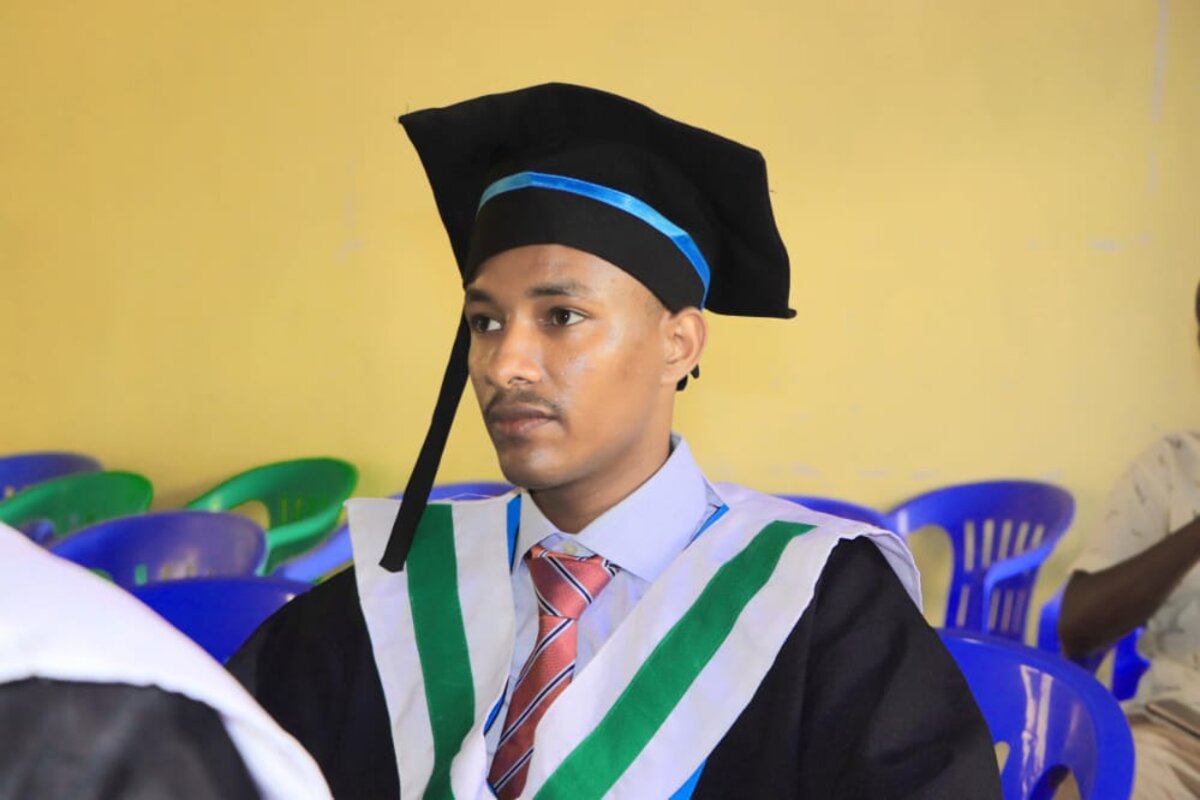
New opportunities
One of the many inmates whom Mr. Ibrahim has taught is Afrah Ali Abdi, a 35-year-old man, who, during his 18 months in prison, learnt how to read and write.
“Abdi was a good student at the prison, he was eager to learn. To him, in a way, the prison was a blessing in disguise as he came out better than the way he was before his arrest despite the challenges at the prison,” Mr. Ibrahim says.
Now back in his local community in Kismayo, Mr. Abdi works as a storekeeper at a local company with his newly-acquired skills.
“I don’t think I would have had this opportunity without my learning in prison, the classes I took at the prison enable me to unlock my potential and today I keep records at the store,” Mr. Abdi says, adding, “Mr. Ibrahim devoted his time and energy to change our course and become productive citizens.”
Mr. Ibrahim says there are many now-released inmates who are doing meaningful jobs in their respective communities like his former student, Mr. Abdi, and it is stories of development and progress like his which motivate him.
“Some of our former students have not only gone on to get stable jobs and reconcile with their families, they have even started their own businesses,” he notes.
Whether in regular schools or in the country’s prisons, he believes that providing his fellow Somalis with an education – regardless of their backgrounds – is a direct way to make an impact at the local community and national levels.
“In Somalia today, there are so many students who are eager to learn and teach their fellow Somalis, although they have never seen a functioning government in their entire lives, which in itself indicates that there is an upcoming Somali generation that has the potential to change Somalia through education,” Mr. Ibrahim says.
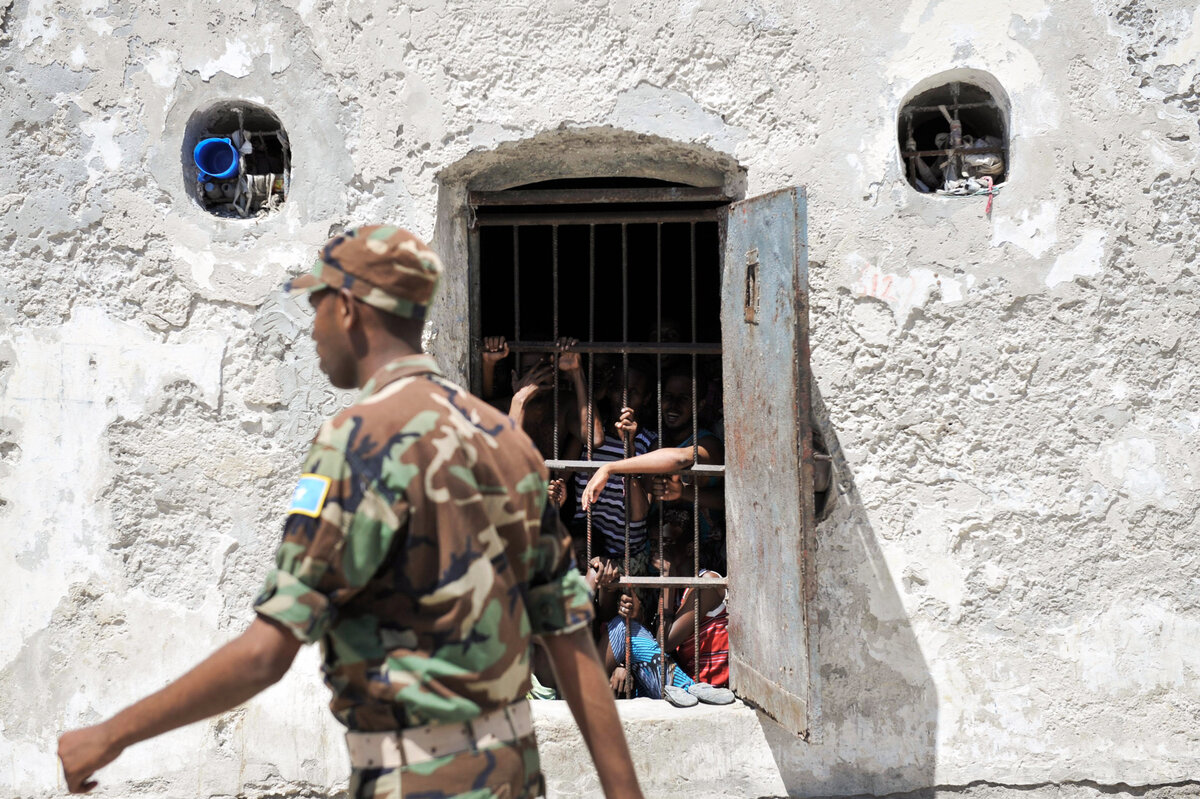
Thematic Photo: AU UN IST
Appreciation
The Kismayo Central Prison’s staff appreciate Mr. Ibrahim’s efforts, and have nothing but praise for him. They say the benefits of the teaching have extended beyond the individual inmates.
“His teaching has helped start teamwork among the inmates; they now interact and talk to each other which was not the case before Mr. Ibrahim’s intervention. Even our interaction with the inmates has tangibly changed, with the inmates now busy and focused on learning thanks to his efforts,” says the Regional Commander of the Kismayo Custodial Corps, Mohamed Aqib Hirsi.
“Although he struggles to deliver lessons without basic equipment, even a projector, let alone other training materials for prisoners, he tries to do all he can to help us at the prison – we would be grateful if we could receive training and learning materials for the programme,” Mr. Hirsi adds.
Mr. Ibrahim was among 20 prison staff members who took part in two consecutive capacity-building courses in Jubaland in 2021. The courses were organized by the United Nations Assistance Mission in Somalia (UNSOM) on leadership and management, including of crises, with subjects including security management and international human rights standards.
“Before, it was just armed men guarding prisoners so as to prevent them from escaping from the prison; there was no knowledge of how to handle the prisoners, on what were their rights and responsibilities. Now they are aware of how to handle and manage an inmate, and we need more of such trainings,” Mr. Hirsi says.
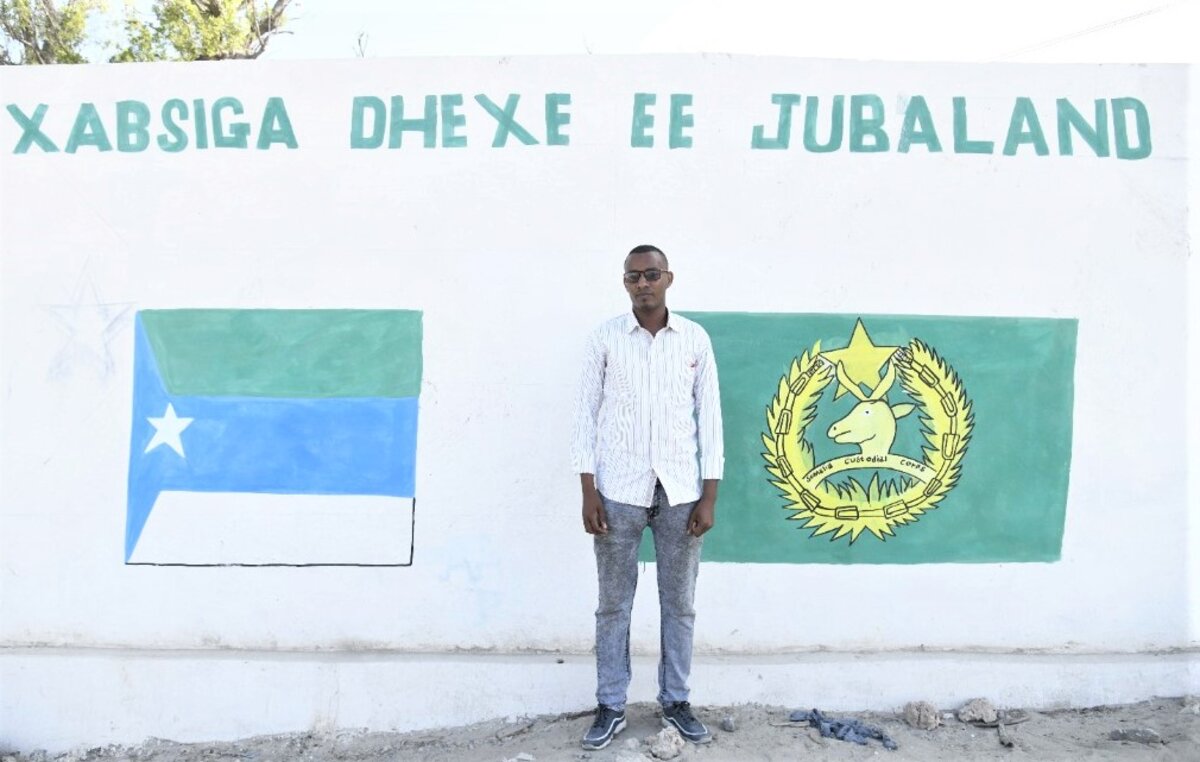
Mr. Ibrahim’s efforts were further recognized in 2021 with his selection to attend UN-backed training on national laws and international standards for ensuring the safety and security of the prisoners, as well as their humane treatment while in custody.
“Since Mr. Ibrahim joined the prison, the prison conditions have improved, and even the prison coordination with the United Nations in Kismayo, and we will build on the renewed cooperation with the prison officers in the Kismayo Central Prison,” says Agnes Rebecca Gabu, an UNSOM Corrections Officer based in Kismayo who has provided trainings for the volunteer teacher and other prison staff.
“There is a remarkable improvement on the functional literacy level of inmates,” she adds.
UNSOM supports the country’s National Development Plan goal to establish independent, accountable and efficient justice institutions capable of addressing the justice needs of the people of Somalia. It does this through the professionalisation of its Custodial Corps, the establishment of correctional facilities operating in accordance with national laws and international standards, and developing a unified legal framework.
Image: UNODC
Adopted in 1955, the UN Standard Minimum Rules for the Treatment of Prisoners is the first legal instrument created in the body of standards and norms in crime prevention and criminal justice.
According to a UN manual published in 1995, ‘Basic Education in Prisons,’ there are millions of people in prisons and other correctional institutions throughout the world, and most of them have no higher vocational or other advanced education, and a large minority – commonly between 25 and 40 per cent – face difficulties in reading, writing, numeracy and social interaction.
The manual notes that the right to basic education in prisons has been shown to be a prerequisite for achieving the internationally agreed goal of ensuring a basic level of education for all.
Source: UNSOM

